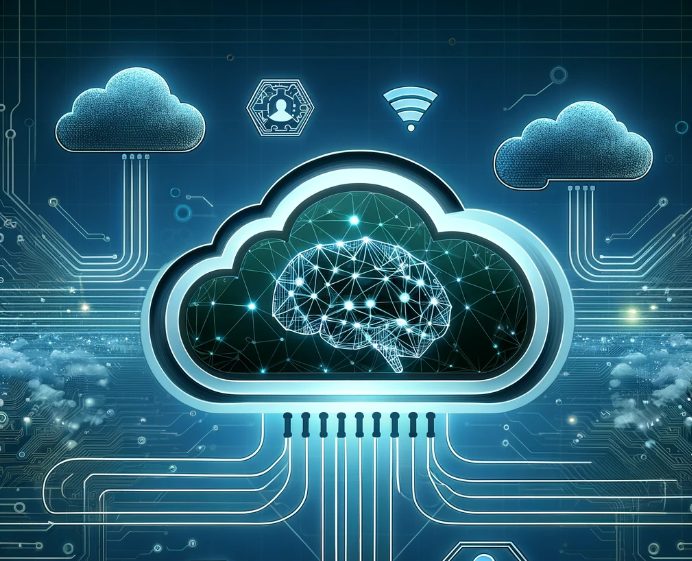
An innovative world that is dominated by technological advancements has seen the convergence of cloud technologies emerge as a force capable of bringing about transformation. This most recent innovation is reshaping the future of blockchain technology and artificial intelligence by enhancing safety and opening up possibilities that were previously unimaginable.
Cloud computing will make a significant contribution to the development of artificial intelligence and blockchain technology in the future. A variety of fields, including healthcare, e-commerce, supply chain management, and finance, among others. In the next era, digital environments will be decentralized, intelligent, and secure. This emergence lays the groundwork for that day. The following are some examples of how cloud technology has an impact on these fields:
Boost Scalability
Cloud technology provides scalable systems and resources, allowing blockchain and AI applications to handle massive volumes of data while performing complex algorithms more effectively. This scalability enables AI systems to train on big datasets and blockchains, allowing them to process more transactions.
The technology provides the scalability required to support the highly resource-intensive environment of blockchain and AI applications. Whether completing blockchain transactions or handling massive amounts of data, the cloud permits resources to be ramped up or down as needed, increasing affordability and performance.
Cloud Platforms Offer Cost-Effectiveness.
The cloud provides cost-effective and efficient solutions for developing and implementing blockchain and artificial intelligence. Services such as Azure Search and ElasticSearch demonstrate the competitive edge of cloud-based integrations. These popular search-as-a-service cloud technologies come with varying features, pricing, and functionality but ultimately serve the same purpose: to enable robust and scalable search solutions for applications. A detailed comparison at Redwerk between Azure Search vs. ElasticSearch shows the nuances in their approach to delivering these services, highlighting the importance of choosing the right tools to maintain high standards and performance in cloud-driven environments. Businesses leveraging cloud computing report significant improvements in cybersecurity and compliance capabilities, alongside the economic benefits.
Collaboration and Data Sharing
Cloud storage can enhance the security and compliance of data sharing and collaboration by enabling encryption, authorization, authentication, and computing for your data.
To ensure a safe data environment, users may control who has access to and can update their data, as well as monitor and track changes and activities, to ensure a safe data environment.
Cloud technologies facilitate collaboration and data sharing among blockchain and AI developers. Cloud systems are centralized, allowing various stakeholders or leaders to control and contribute input to AI apps and blockchain networks, resulting in technical innovation and shared intelligence.
Intelligent Contracts Driven by AI
Artificial integration enhances AI-powered contracts with coded phrases, says McKinsey. AI has analytic capabilities that can investigate complex settings, enabling smart contracts to adapt to shifting scenarios. This dynamic capability improves automation and intelligence in executing contracts.
Confidentiality and Security
To protect sensitive data and guarantee privacy, cloud computing developers have developed and invested in various security methods to protect sensitive data and guarantee privacy. Blockchain and artificial intelligence applications that deal with sensitive data are required. By enhancing cloud security features, industries can improve the security and confidentiality of their blockchains and artificial intelligence systems.
The integration of blockchain and artificial intelligence into cloud-based systems has the potential to create a powerful combination that provides robust visibility and safety. AI algorithms can investigate blockchain data for anomalies that conventional methods may miss. It provides strong protection against data theft and other malicious acts while preserving a transparent environment for blockchain transactions.
Democratization
The impact of democratization in AI appears most visible and in very unique fields, says TechTarget. The cloud facilitates multiple services, such as IaaS, PaaS, and SaaS. With these cloud-based services, the field of AI converges.
Small businesses can leverage cloud-based apps to access AI and blockchain services without spending much. It helps small organizations adapt to the latest trends and innovations from these powerful technological innovations.
Here are some of the advantages:
- Democratization reduces barriers to access for both users and enterprises, which is crucial for developing data sciences.
- Democratization reduces the cost of developing AI solutions.
- It allows you to quickly generate incredibly accurate models.
- Its solutions are easy to use and widely adopted.
- Democratization improves the capability of identifying hate speech by integrating AI solutions.
Businesses that have embraced democratization by merging AI and blockchain networks allow users to access, alter, and exchange files with authority personnel, including their source code.
Effects on Businesses and the Community
The integration of artificial intelligence, cloud computing, and blockchain technology into business operations is critical for improving the dynamic nature of corporate operations, delivering real-time insights, and enhancing security.
For the benefit of society, it provides improved connectivity and intelligent urban facilities, enhanced medical services, and more precise supply chains, all of which contribute to a world that is more modern, sustainable, and secure.
The combination of these sophisticated technologies presents unique obstacles. However, its application results in significant improvements for businesses and society as a whole. Integrating these technologies provides seamless data privacy while also ensuring equal access for all users with authorization.
Conclusion
The combination of cloud technology, AI, and blockchain represents a fundamental shift in how we use technology. The introduction of these technologies represents not merely an innovation but an upheaval.
With these unparalleled opportunities, businesses, entrepreneurs, and developers may design a future in which intelligence, scalability, and trust emerge to alter the boundaries of what is possible in the digital realm.
Cloud technology transforms how we understand operations and services. Though using the technology itself involves a learning curve, those in the digital domain are not immune to this meta-work, which indicates that AI technologies are within our grasp.
It is critical to note that the aforementioned domains are just a few of the ways cloud technologies are affecting the future of blockchain and AI. The integration of these technologies creates novel prospects and possibilities for several sectors, driving growth and change.
Last Updated: April 11, 2024




















